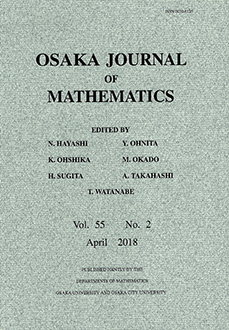Abstract
Consider the Cauchy problem for a system of weakly coupled heat equations, whose typical one is \begin{equation*} \left\{ \begin{array}{@{}ll@{}} u_{t} - \Delta u = \lvert v \rvert^{p-1}v,\\ v_{t} - \Delta v = \lvert u \rvert^{q-1}u, & (t, x) \in \mathbf{R}_{+} \times \mathbf{R}^{N}, \end{array} \right. \end{equation*} with $p,q \ge 1$, $pq > 1$. When $p,q$ satisfy $\max((p+1)/(pq-1),(q+1)/(pq-1)) < N/2$, the exponents $p,q$ are supercritical. In this paper we assort the supercritical exponent case to two cases. In one case both $p$ and $q$ are bigger than the Fujita exponent $\rho_{F}(N)=1+2/N$, while in the other case $\rho_{F}(N)$ is between $p$ and $q$. In both cases we obtain the time-global and unique existence of solutions for small data and their asymptotic behaviors. These observation will be applied to the corresponding system of the damped wave equations in low dimensional space.
Citation
Kenji Nishihara. "Asymptotic behavior of solutions for a system of semilinear heat equations and the corresponding damped wave system." Osaka J. Math. 49 (2) 331 - 348, June 2012.
Information





